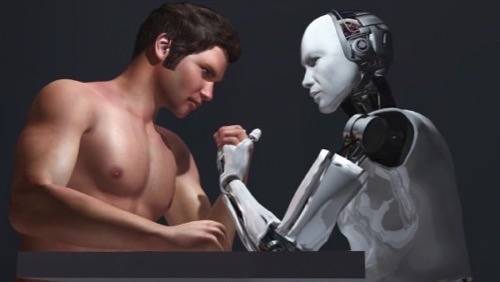
We’ve got two paths into the future: We can chill out, learn to manage our dependence on digital devices and streams of information and figure out how to balance today’s crazy productivity requirements with our personal lives. Or we can jack ourselves into the matrix, pump our bodies with steroids and “cognitive enhancers” and become unrecognizable worker-mutants. And if the folks we’re competing with are determined to go the mutant route, do we even have the choice to opt out?
I just read a scary AP article based on a British academic report about the “superhuman workplace.” The authors warn that we aren’t preparing our businesses and institutions for the consequences of a trend that’s already well underway. People are taking speed to stay alert longer and they’re strapping wearable computers to their bodies for constant connection — and tracking. More to the point, companies are starting to realize these technologies could offer a tempting performance boost to their workforce.
If it suddenly becomes profitable to hire jacked-up cyborg mutants, what do you think that’s going to do to the job market for your typical Homo sapiens?
It’s the Lance Armstrong conundrum. If enough others in the sport are doping, you either dope, too, or you lose. You may want to live in a future populated by recognizable humans, working on or with computers, but still living at a natural pace, taking breaks, eating and sleeping regularly, all that good stuff. But if your colleagues and competitors are all frying on Ritalin — or have an extra pair of super-strong titanium arms — whose going to hire plain old you?
We’ve started a series called ReadWrite Pause, where we’re trying to figure out how to balance our digital and analog lives. We love technology, like most of you surely do, but we’re also wary of letting it control us. As work moves into the proverbial cloud, and our responsibilities become always-on multitasks, we’re compelled to be constantly connected, always “at work.” We suspect this isn’t good for the ancient, essentially human parts of us.
Digital technology is a performance-enhancing drug. It makes us capable of getting much more done, in good and bad ways. That’s why, if we don’t get a handle on this soon and figure out what we really want for a future, the economy of tomorrow might not leave us with a choice.
Lead image courtesy of Shutterstock.










